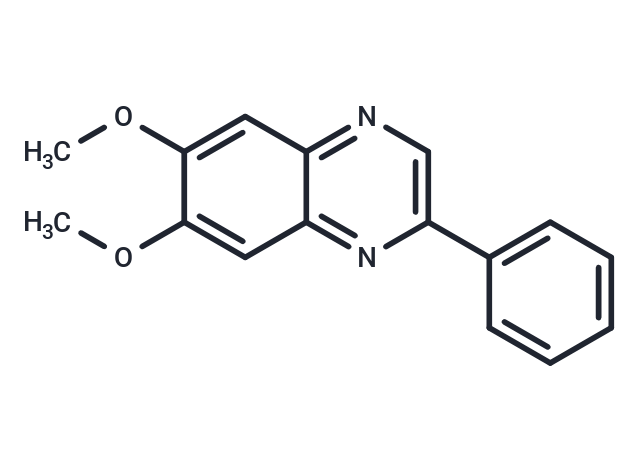Shopping Cart
- Remove All
 Your shopping cart is currently empty
Your shopping cart is currently empty

Tyrphostin AG1296 (Tyrphostin AG 1296) is an inhibitor of PDGFR with IC50 of 0.3-0.5 μM, no activity to EGFR.

| Pack Size | Price | Availability | Quantity |
|---|---|---|---|
| 2 mg | $34 | In Stock | |
| 5 mg | $53 | In Stock | |
| 10 mg | $92 | In Stock | |
| 25 mg | $190 | In Stock | |
| 50 mg | $293 | In Stock | |
| 100 mg | $433 | In Stock | |
| 200 mg | $616 | In Stock | |
| 1 mL x 10 mM (in DMSO) | $74 | In Stock |
| Description | Tyrphostin AG1296 (Tyrphostin AG 1296) is an inhibitor of PDGFR with IC50 of 0.3-0.5 μM, no activity to EGFR. |
| Targets&IC50 | c-Kit (Swiss 3T3):1.8 μM, FGFR (Swiss 3T3):12.3 μM, PDGFR:0.3 μM-0.5 μM |
| In vitro | AG 1296 inhibits selectively the PDGF receptor kinase and the PDGF dependent DNA synthesis in Swiss 3T3 cells and in porcine aorta endothellal cells with 50% inhibitory concentrations below 5 and 1μM, respectively. AG1296 inhibits FGFR and c-Kit with IC50 of 12.3 μM and 1.8 μM in Swiss 3T3 cells. AG1296 potently inhibits signaling of human PDGF -α and -β receptors but has no effect on autophosphorylation of the VEGFR KDR or on DNA synthesis induced by VEGF in porcine aortlc endothelial cells. Treatment by AG1296 reverses the transformed phenotype of sis-transfected NIH 3T3 cells but has no effect on src-transformed NIH3T3 cells.AG1296 is an ATP-competitive inhibitor. AG1296 interferes neither with PDGF binding nor with PDGF receptor dimerization while it abolishes PDGF receptor autophosphorylation. Thus, AG1296 is a pure inhibitor of the catalytic activity of the receptor tyrosine kinase. |
| Kinase Assay | Membrane Autophosphorylation Assays:Membranes are prepared from confluent cultures of Swiss 3T3 cells as described. For measuring receptor autophosphorylation, 10μg membrane protein per assay are incubated for 20 min on ice in the presence of 1.2μg/mL EGF or 2μg/mL PDGF, or both; 50 mM Hepes (pH 7.5); and 3 mM MnCl2 in a volume of 45μl. In order to test the effects of tyrphostins, these are added in a volume of 0.5 μl (in DMSO; final concentration, 0.5%) 15 min before addition of the growth factors. Phosphorylation is initiated by addition of [γ-32P]ATP and terminated after 2 min by addition of 10μL of a solution containing 6% SDS, 30%β-mercatoethanol, 40% glycerol, and 0.5 mg/mL bromophenol blue. The samples are heated for 5 min at 95 ℃ and subjected to SDS-PAGE using 10% acrylamide gels. The gels are stained and dried and subjected to autoradiographic analysis. |
| Cell Research | Cell lines: Swiss 3T3. Concentrations: ~50 μM. Incubation Time: 3 days. Method: Cells are seeded in 24-well plates (5000 cells/well) in DMEM/10% FCS.On the next day the medium is changed to DMEM/2% FcS with or without growth factors and tyrphostins are added as indicated.Three days later the cells are counted in a hemocytometer |
| Alias | Tyrphostin AG 1296, AG 1296 |
| Molecular Weight | 266.29 |
| Formula | C16H14N2O2 |
| Cas No. | 146535-11-7 |
| Smiles | COc1cc2ncc(nc2cc1OC)-c1ccccc1 |
| Relative Density. | 1.192 g/cm3 (Predicted) |
| Storage | Powder: -20°C for 3 years | In solvent: -80°C for 1 year | Shipping with blue ice. | |||||||||||||||||||||||||
| Solubility Information | DMSO: 11 mg/mL (41.31 mM), Sonication is recommended. H2O: < 1 mg/mL (insoluble or slightly soluble) Ethanol: < 1 mg/mL (insoluble or slightly soluble) | |||||||||||||||||||||||||
Solution Preparation Table | ||||||||||||||||||||||||||
DMSO
| ||||||||||||||||||||||||||

Copyright © 2015-2025 TargetMol Chemicals Inc. All Rights Reserved.